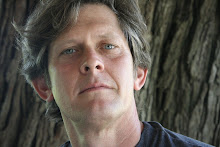
Have you ever driven an automobile forward while looking in the rear-view mirror? Don't tell anybody, but I've tried it a few times. Doesn't work very well.
Sure, if the road is perfectly straight with no oncoming traffic, you could feasibly travel short distances, albeit very, very slowly. But I think we could all agree (including our friendly Highway Patrolmen) that driving any distance in a car with your eyes glued to the rear-view mirror is unfeasible and, in fact, dangerous.
Prudence tells us we need to steer our vehicle based on what we see in front of us. What's coming up over the horizon is the determining factor in how we choose to direct our course of action.
So why would we plan for the future by imitating the past? Why should we base decisions about how we build buildings and infrastructure, about how we design our cars and factories, by mimicking old paradigms?
We know what's coming up on the horizon, at least to some degree, and we certainly have a clear focus on our immediate future. The distant future may be a little murky, but that's no reason to discount it, no reason to throw up our hands and say 'I don't know what the road looks like around the curve so I'll just close my eyes and lock the steering wheel in place'.
Here's one thing we know. Some energy sources are finite - oil and coal for example. Some energy sources are infinite - solar and wind and geothermal fall into this category. What does this tell us? In the future, renewable sources of energy will come down in price, and thus be more feasible to employ, and non-renewable sources of energy will become ever more scarce, and the price of utilizing non-renewables will go up and up and up. Already, the trajectory is apparent and playing out right in front of us.
And with the earth's growing population (estimates are in the next half decade, world population will increase from the current 6.7 billion people to over 10 billion), we know we must design for accomplishing more with less.
Transportation planning must recognize that the automobile is one option of many, not the only option. Public transportation infrastructure takes years, if not decades to implement; that makes it all the more important to design for what's on the horizon.
Cars must be dramatically re-designed to meet the obvious challenges of the future. For years, American automobile manufacturers have been resistant to change because they've been focused on what sold last year. Now big gas-guzzling SUV's sit on the lot while dealers place hybrid buyers on long waiting lists.
Buildings must be designed to be more energy efficient, some even for energy independence. Ease and economy of construction is a must. The McMansions that popped up like mushrooms as recently as a year and a half ago, are already dinosaurs.
Doesn't it make sense to design for where we want to go rather than parody where we've already been?







